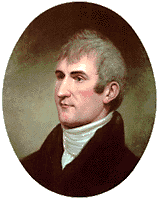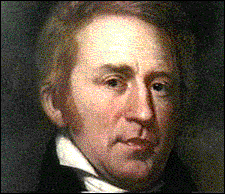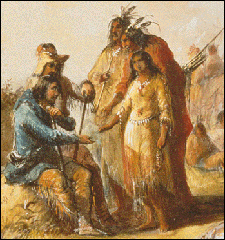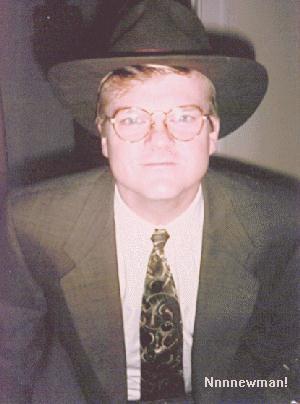
Hist 1810
"Lewis and Clark
and the American Empire"
Instructor
Dr. Paul Douglas Newman Krebs 123, O:269-2987, H:535-3176, Office Hours:
Tues and Thurs 11-12 and by appointment.
Aims of "Lewis and Clark"


 This three credit course will explore the "American" ideas, myths, and
realities about "the West" and its human and non-human inhabitants, and
its environmental and geographical features around the birth of the Republic.
It will use the famed expedition of the "Corps of Discovery" led by Merriweather
Lewis (above) and William Clark (left) for 1805-1807 as a prism to investigate
a myriad of issues facing the infant United States, including: physical
expansion, Native American and foreign relations (Sacajawea on right),
the relationship of Americans to their environment, trade, national defense,
slavery and multi-culturalism just to name a few. The class will be structured
as an upper level reading seminar. A number of historical essays will be
assigned for every meeting which will serve as the basis for class discussion.
Given the primary importance of discussion, verbal participation will be
mandatory in each class meeting.
This three credit course will explore the "American" ideas, myths, and
realities about "the West" and its human and non-human inhabitants, and
its environmental and geographical features around the birth of the Republic.
It will use the famed expedition of the "Corps of Discovery" led by Merriweather
Lewis (above) and William Clark (left) for 1805-1807 as a prism to investigate
a myriad of issues facing the infant United States, including: physical
expansion, Native American and foreign relations (Sacajawea on right),
the relationship of Americans to their environment, trade, national defense,
slavery and multi-culturalism just to name a few. The class will be structured
as an upper level reading seminar. A number of historical essays will be
assigned for every meeting which will serve as the basis for class discussion.
Given the primary importance of discussion, verbal participation will be
mandatory in each class meeting.
There will also be a series of required writing assignments: in-class
essay quizzes on the readings, several typed essays, and a term paper.
There will be no "examinations" in this course, but do not let that fool
you--this class is not for the feint of heart--the reading load will be
heavy and the writing will be constant. As a result, however, you will
emerge from the course not only with a greater understanding of the Lewis
and Clark Expedition, but also with fine-tuned reading, analytical, and
writing skills.
The Course
Books
1. Stephen Ambrose, Undaunted Courage: Merriweather Lewis, Thomas Jefferson,and
the Opening of the American West
2. Daniel Botkin, Our Natural History: The Lessons of Lewis and Clark
3.Bernard DeVoto, ed., The Journals of Lewis and Clark
4.James Ronda, Lewis and Clark Among the Indians
Attendance
You should attend all classes, however, I am not going to baby you with
an attendance policy. None of you are freshman so I do not feel the need
to hold your hands. I will call the roll each class an keep a record for
myself but this will not be used either against you or in your favor--it
will just help me to better understand your performance at term's end.
Reading
As mentioned above, there will be an extremely heavy reading load in this
course, and each class will serve as a discussion that will revolve around
that reading. Therefore, you must read the assignments in order for this
class to work. If you fail to complete a reading assignment there is little
reason for you to come to that class.
Grading
Grading for this class will be based on a point system: a 500 point scale.
900-999=A, 800-899=B, 700-799=C, 600-699=D, 000-599=F
Quizzes
There will be periodic, unannounced quizzes on the reading assignments--some
open book and some not. They will account for 100 points (20%).
Class Participation
You will be expected to participate in every class discussion. Participation
will account for 100 points (20%).
Book Reviews
You will write two, 3-5 page typed book reviews on Botkin, Our Natural
History, and Ronda, Lewis and Clark Among the Indians. Instructions for
how to write a book review follow later in the syllabus. The book reviews
will be graded on writing as well as content for a total of 100 points
each (20% each). Students who receive a C, D, or F will be scored on a
scale of 75 points, and will be required to re-write their paper for a
percentage of the remaining 25 points. This is NOT a punishment, but a
way for you to improve both your grade and your writing skills. Students
receiving a B will have the option of rewriting their paper under the same
terms as listed above.
Term Papers
In addition to Ambrose, Botkin, and Ronda, you have also been required
to purchase The Journals of Lewis and Clark. You will use the Journals
as a primary resource for your 10-12 page term paper for 100 points (20%).
By February 26, you will decide on and inform me in writing of your topic.
By March 12, you will produce a typed bibliography of at least ten secondary
sources (non-internet). You will hand in your first draft on April 2 for
75 points, and you will hand in your revision by Tuesday, April 21.
Field Trips
There will be three optional, VOLUNTARY, field trips associated with this
class that will take place no matter what the weather will bring. To get
a feel for what the Corps of Discovery ex[eroemced, we will engage in some
hiking, backpacking, and primitive camping in March and April. In March,
I will lead two, one-day hiking and backpacking trips in order to acclamate
you to the techniques of backpacking and primitive camping. On March14
we will take a day hiking trip on the trails at Prince Gallitzin State
Park in northern Cambria County, and then on March 28 we will take a day
trip hiking and backpacking on the Lost Turkey Trail in Babcok Ridge State
Forest in sourtheastern Cambria County. Then on April 4-5, we will take
an overnight, hiking, backpacking, and camping trip on the John P. Saylor
Memorial Trail in Babcock Ridge State Forest. You will take these trips
at your own risk. To clear myself and the University from liability, you
will all be required to sign a waiver disclaiming your right to sue me
or the University should you be injured on the excursions. Having said
that, I'd like to add that these are very safe trails, and should we all
act responsibly there will not likley be any serious problems. I will find
an outfitter to rent you equipment for the overnight and you will be expected
to shoulder the cost of that rental. I will distribute a handout in February
detailing the clothing and equipment that you will need.
Course Outline
Key: A=Ambrose, B=Botkin, R=Ronda
1. Introductions and other pleasantries.
2. A--Introduction, 1
3. A--2, 3
4. A--4
5. A--5, 6
6. A--7, 8
7. A--9, 10
8. A--11, 12
9. R--Prface, 1, 2, 3, 4, 5
10. R--6, 7, 8, 9, Afterword
11. A--13, 14
12. A--15, 16
13. A--17, 18
14. A--19, 20
15. A--21
16. A--22
17. A--23, 24
18. A--25, 26
19. B--Preface, 1, 2, 3, 4, 5, 6
20. B--7, 8, 9, 10, 11
21. A--27, 28
22. A--29, 30
23. A--31, 32
24. A--33, 34
25. A--35, 36
26. A--37, 38, Aftermath
 Back
Back




 This three credit course will explore the "American" ideas, myths, and
realities about "the West" and its human and non-human inhabitants, and
its environmental and geographical features around the birth of the Republic.
It will use the famed expedition of the "Corps of Discovery" led by Merriweather
Lewis (above) and William Clark (left) for 1805-1807 as a prism to investigate
a myriad of issues facing the infant United States, including: physical
expansion, Native American and foreign relations (Sacajawea on right),
the relationship of Americans to their environment, trade, national defense,
slavery and multi-culturalism just to name a few. The class will be structured
as an upper level reading seminar. A number of historical essays will be
assigned for every meeting which will serve as the basis for class discussion.
Given the primary importance of discussion, verbal participation will be
mandatory in each class meeting.
This three credit course will explore the "American" ideas, myths, and
realities about "the West" and its human and non-human inhabitants, and
its environmental and geographical features around the birth of the Republic.
It will use the famed expedition of the "Corps of Discovery" led by Merriweather
Lewis (above) and William Clark (left) for 1805-1807 as a prism to investigate
a myriad of issues facing the infant United States, including: physical
expansion, Native American and foreign relations (Sacajawea on right),
the relationship of Americans to their environment, trade, national defense,
slavery and multi-culturalism just to name a few. The class will be structured
as an upper level reading seminar. A number of historical essays will be
assigned for every meeting which will serve as the basis for class discussion.
Given the primary importance of discussion, verbal participation will be
mandatory in each class meeting.
